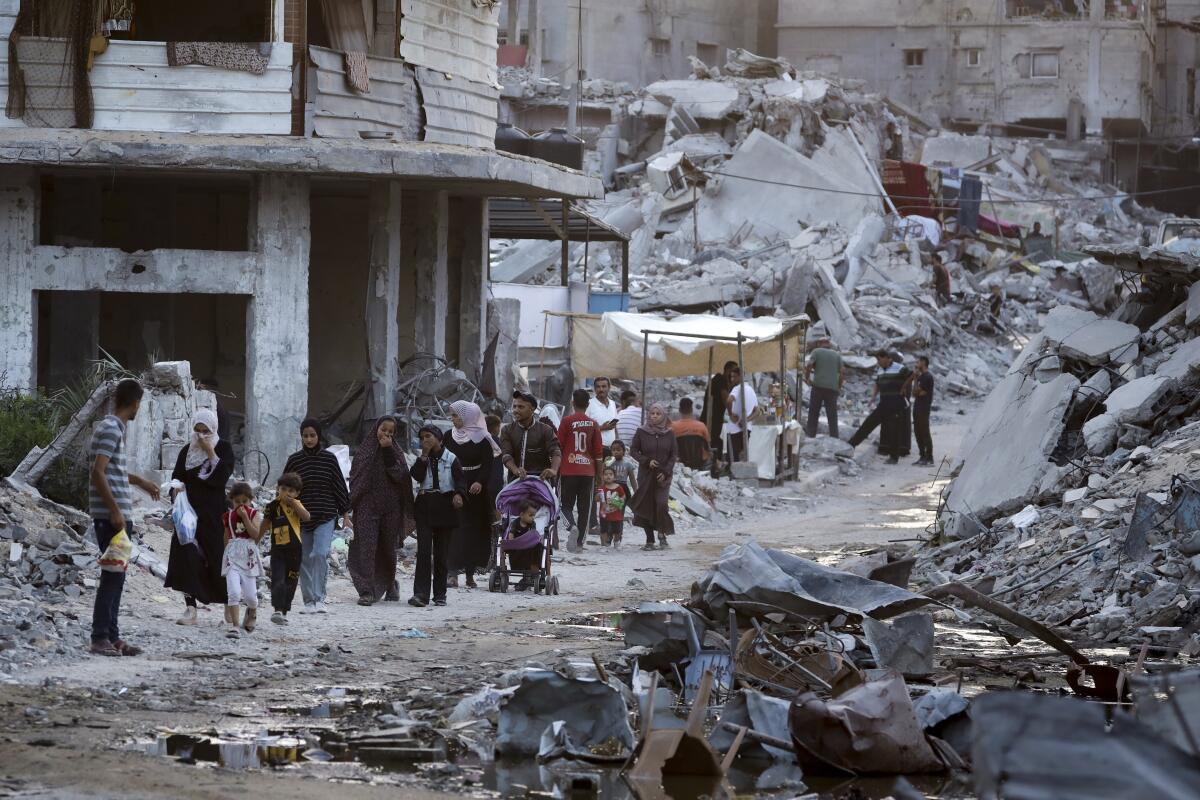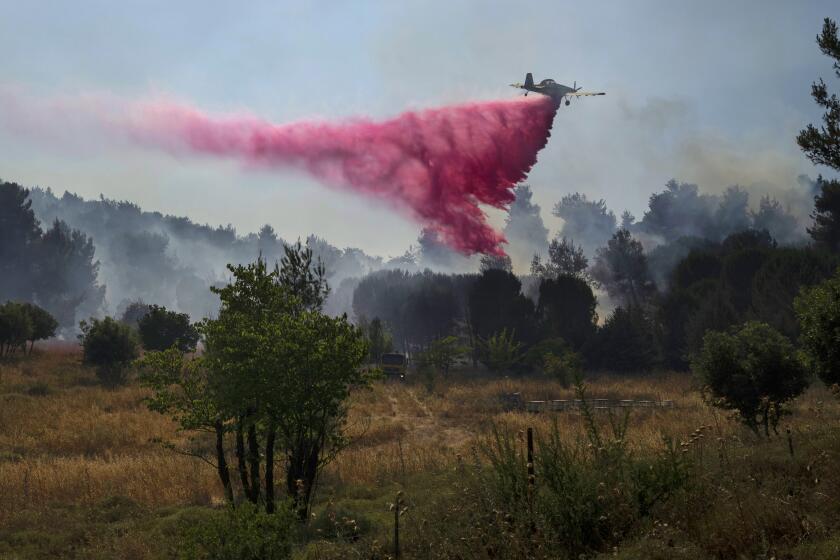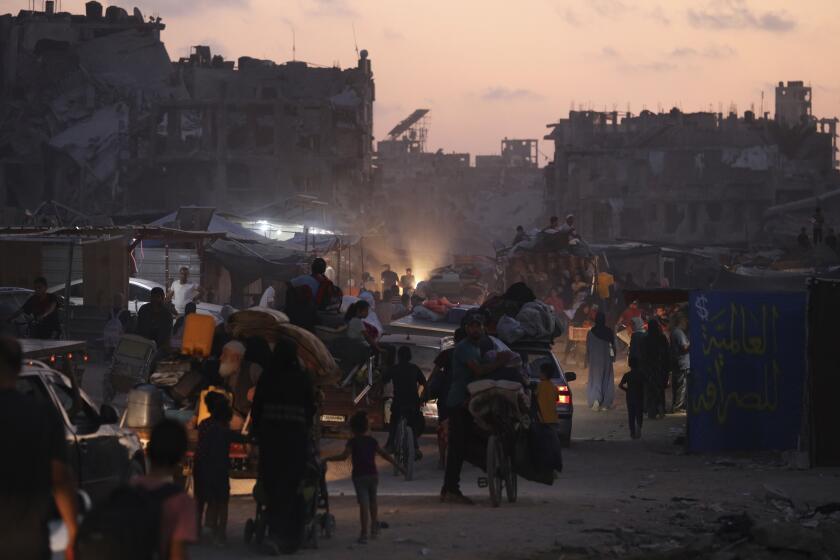Hamas clears the way for a possible cease-fire after dropping key demand, officials say

- Share via
DEIR AL BALAH, Gaza — Hamas has given initial approval for a U.S.-backed proposal for a phased cease-fire deal in Gaza, dropping a key demand that Israel give an up-front commitment for a complete end to the war, a Hamas and an Egyptian official said Saturday.
The apparent compromise by the militant group — which controlled Gaza before triggering the war with an Oct. 7 attack on Israel — could help deliver the first pause in fighting since November and set the stage for further talks on ending a devastating nine months of fighting. But all sides cautioned that a deal is still not guaranteed.
Inside Gaza, the Health Ministry said an Israeli airstrike on a school-turned-shelter killed at least 16 people and wounded at least 50 others in the Nuseirat refugee camp. Children were among the dead and wounded. Israel’s military said it struck several “terrorists” operating in the area of the school and had tried to lessen the risk to civilians.
The officials who spoke on condition of anonymity to discuss ongoing negotiations said Washington’s phased deal will first include a “full and complete” six-week cease-fire that would see the release of a number of hostages, including women, older people and the wounded, in exchange for the release of hundreds of Palestinian prisoners. During the 42 days, Israeli forces would withdraw from densely populated areas of Gaza and allow the return of displaced people to their homes in northern Gaza, the officials said.
Sometimes in Gaza it feels like a cigarette is the only thing that might help. But even that is out of reach.
Over that period, Hamas, Israel and mediators would negotiate the terms of the second phase that could see the release of the remaining male hostages, both civilians and soldiers, the officials said. In return, Israel would free additional Palestinian prisoners and detainees. The third phase would see the return of any remaining hostages, including bodies of dead captives, and the start of a yearslong reconstruction project.
Hamas still wants “written guarantees” from mediators that Israel will continue to negotiate a permanent cease-fire deal once the first phase goes into effect, the officials said.
The Hamas representative told the Associated Press the group’s approval came after it received “verbal commitments and guarantees” from the mediators that the war won’t be resumed and that negotiations will continue until a permanent cease-fire is reached.
“Now we want these guarantees on paper,” he said.
Months of on-again off-again cease-fire talks have stumbled over Hamas’ demand that any deal include a complete end to the war. Prime Minister Benjamin Netanyahu has offered to pause the fighting but not end it until Israel reaches its goals of destroying Hamas’ military and governing capabilities and returning all hostages held by the militant group.
The escalating war between Hezbollah and Israel — coupled with scorching heat — has sparked fires that are destroying forests and farmland.
Hamas has expressed concern Israel will restart the war after the hostages are released. Israeli officials have said they are worried Hamas will draw out the talks and the initial cease-fire indefinitely, without releasing all the hostages.
Netanyahu’s office did not respond to requests for comment, and there was no immediate comment from Washington. On Friday, the Israeli prime minister confirmed that the Mossad spy agency’s chief had paid a lightning visit to Qatar, a key mediator. But his office said “gaps between the parties” remained.

“For the first time in many months, we feel hopeful,” a statement by many families of hostages said. “Netanyahu, we have seen how you repeatedly thwart deals in real time. Don’t you dare break our hearts again.” Anti-government protesters gathered again Saturday night, including a large march in Tel Aviv.
Israel launched the war in Gaza after Hamas’ October attack in which militants stormed into southern Israel, killed some 1,200 people — mostly civilians — and abducted about 250. Israel says Hamas is still holding about 120 hostages — about a third of them now thought to be dead.
Since then, the Israeli air and ground offensive has killed more than 38,000 people in Gaza, according to the territory’s Health Ministry, which does not distinguish between combatants and civilians in its count. The offensive has caused widespread devastation and a humanitarian crisis that has left hundreds of thousands of people on the brink of famine, according to international officials.
The cease-fire deal would lead to around 600 trucks of humanitarian aid entering Gaza daily, with half of them bound for the hard-hit northern part of the enclave, the two officials said. Since Israel’s assault on the southernmost city of Rafah, aid supplies entering Gaza have been reduced to a trickle.
An Israeli airstrike killed a prominent Palestinian doctor and eight members of his extended family after they complied with orders to evacuate.
“We want to eat, but from where we can eat? The country is exhausted. The country is destitute. It is not suitable for living,” said Walid Hegazi, a resident of the Jabaliya refugee camp in northern Gaza. “We’re sorry for the donkeys because we ate their wheat and barley.”
Also Saturday, the Hamas-run Interior Ministry said four police officers were killed in an Israeli airstrike Saturday in Rafah. The ministry, which oversees civilian police, said the officers were killed during foot patrol securing properties. It said eight other police officers were wounded. Israel’s military did not immediately respond to questions.
In Deir al Balah, prayers were held for 12 Palestinians, including five children and two women, killed in three separate strikes in central Gaza on Friday and Saturday, according to hospital officials. The bodies were taken to Al Aqsa Martyrs Hospital, where AP journalists counted them.
Two of those killed in a strike that hit the Mughazi refugee camp Friday were employees with the United Nations agency for Palestinian refugees, the organization’s director of communications told the AP. Juliette Touma said a total of 194 workers with the agency have been killed since October.
A recent Israeli evacuation order in the southern city of Khan Yunis and the surrounding areas affected about 250,000 Palestinians. Many headed to an Israeli-declared “safe zone” centered on the Muwasi coastal area or Deir al Balah.
The ground fighting that has raged in Gaza City’s Shijaiyah neighborhood for the last two weeks has forced tens of thousands of people to flee their homes. Many have sheltered in the Yarmouk Sports Stadium, one of the strip’s largest soccer arenas.
Meanwhile, the conflict between Israeli forces and Hezbollah continued. An Israeli airstrike on a car in the area of Baalbek in eastern Lebanon killed an engineer in Hezbollah’s air defense unit, the Israeli military said in a statement, describing Meitham Mustafa al Attar as a “key operative.” Hezbollah confirmed Al Attar’s death in a statement but did not give information on his position.
In recent weeks, fears have risen that the conflict with its near-daily clashes could escalate to a full-scale war.
Associated Press writer Magdy reported from Cairo, Shurafa from Deir al Balah.
More to Read
Sign up for Essential California
The most important California stories and recommendations in your inbox every morning.
You may occasionally receive promotional content from the Los Angeles Times.













